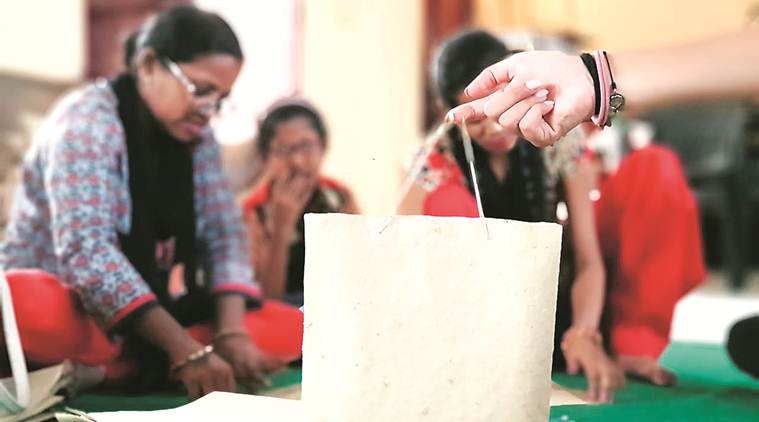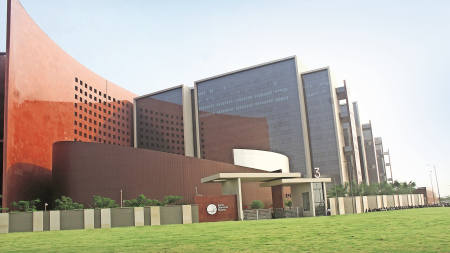- India
- International
Mushroom cultivation, huts & Bio CNG: These start-ups are spinning gold out of paddy stubble in Punjab
Ninety tons of stubble from these villages is converted into pulp and later into thick paper sheets. “These sheets are then transported to Sewa Bharti NGO in Rajouri Garden, Delhi, where women are making products like lampshades, paper bags, and compostable tableware.
 Product made out of paddy stubble. Express Photo
Product made out of paddy stubble. Express Photo
At a time when burning of paddy stubble has become a serious cause for concern, considering the skyrocketing air pollution levels in Punjab, as well as the national capital, students Delhi University’s Hansraj College, have come up with alternatives to put stubble to better use.
Members of ‘Enactus Hansraj’, a college society, are working on a start-up project called ‘Vriddhi’, as part of which they have made huts, hats, lampshades, paper bags, and compostable tableware.
Kartikeya Gupta, project head of ‘Vriddhi’, says stubble can be used for mushroom cultivation and handicrafts as well. “A group of over 80 students of Hansraj college started this project two years ago. Apart from providing employment to women and adding to the income of farmers in Sonipat villages, thousands of acres of farmland has been stopped from being burnt.”
Gupta, a second-year computer science student, said mushroom cultivation has been most successful. The students started it with 65 farmers of Harsanakalan village of Sonipat, out of which 50 were paddy growers two years ago. Gradually, three more villages joined hands with Harsanakalan. Yogesh Kumar, village leader of the mushroom cultivation project, said, “Now Baiyapur, Bandepur, Royat, and Nasirpur have also found mushroom cultivation attractive. Hence no stubble burning has taken place in over 30,000 acres of land for the past 2 years.”
Asked how it works, he said, “We take paddy stubble out of the fields and make huts out of this stubble. Later the remaining stubble is kept inside these huts after mixing with water for about a month and adding cow dung to convert it into compost. Mushroom seeds are added afterward. The crop comes in 20-25 days. We sell these mushrooms in Azadpur Mandi via commission agents at Rs 70 a kg, while some retailers purchase it at Rs 150 a kg as well. I alone have 20 such huts and I am earning Rs 3-4 lakh from these huts. The village has over 200 such straw huts. We never thought of using stubble this way. Earlier we used to burn fields.”

Ninety tons of stubble from these villages is converted into pulp and later into thick paper sheets. “These sheets are then transported to Sewa Bharti NGO in Rajouri Garden, Delhi, where women are making products like lampshades, paper bags, and compostable tableware. “Products are ranging from Rs 100-350. We assume that each woman can earn nearly Rs 24,000 per annum from the sales. As of now, nearly 20 women are engaged in this project,” said Nikkhil Kalia, president of ‘Vriddhi’.
The students are also working on using paddy straw to bind clay for built-up wall construction and manufacturing fired bricks. The resultant product is a lightweight brick which can be used to make toilets in Bhanauta village in Greater Noida. A sample toilet has been built in this village.
Yogesh, a farmer based in Harsanakalan, said, “For us, stubble was waste. But now we have realised it can be use to make compost and even grow mushrooms. We are contributing to saving the environment as well.”
Bio CNG, yarn out of stubble
Meanwhile, in Ludhiana, a biomass handling company called ‘Farm2Energy’ is working on a similar project. The company was started in 2016 by farmer brothers Sukhbir and Kamaljit Dhaliwal with an aim to collect biomass of all crops and deliver the same to the end user.
The company, which started with an investment of around Rs 3 crore, now has an over Rs 12 crore investment, said Preet Chandoke, one of the investors in the company.
Today, eight investors are running the company which is collecting stubble from 50,000 acres of farm land throughout the year, of which 20,000 acres is of paddy crop alone. The stubble is given to power generating units which are using straw as fuel.
“The company is also setting up a plant to make bio CNG out of paddy stubble at Bija village in Khanna. We have got queries from an oil company for purchasing bio CNG as well,” said Sonu Nilibar, another investor.
Chief financial officer Nitin Jain said he recently attended a meeting with Delhi CM Arvind Kejriwal where stakeholders of oil companies were present.
“Biomass is gold in the fields and can be put to many uses, but options are not explored. Funding seems to be a major issue as easy bank loans for biomass collection units are not available,” said Preet, adding, “Last year, we exported two tonnes of paddy stubble to Finland and they had made thread out of it. Large scale production has to be started.”
Buzzing Now
Apr 16: Latest News
- 01
- 02
- 03
- 04
- 05






































